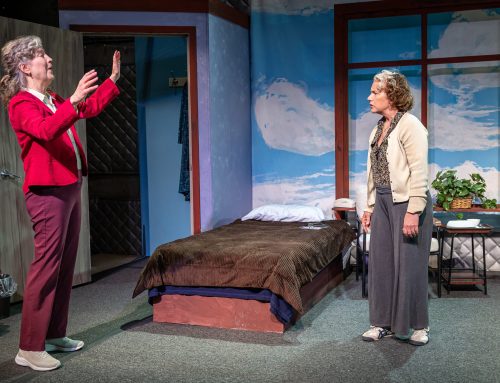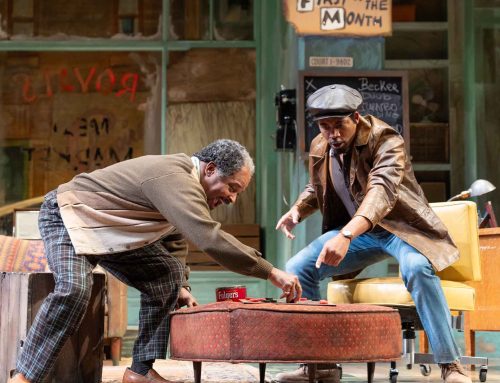at the Oregon Shakespeare Festival

A better title of this production of the seldom-produced Henry VIII would be The Vilma and Tony Show. The performances of Vilma Silva (Queen Katherine) and Anthony Heald (Cardinal Wolsey) alone are enough to make this an extremely satisfying evening of theater.
This play is looked down on as odd — if not downright “bad”. The Oregon Shakespeare Festival avoids it, having last put in on 25 years ago in 1984. The audience was littered with people who are seeing Henry VIII to complete their viewing of the Shakespeare canon.
And, the plot truly is not satisfying. There’s little sense of character development (despite the stated change in attitude of Wolsey). The story of Henry’s reign is abandoned way before his death. And, the resolutions that do come in this putative “history” are deus ex machina spoken completions to the storyline. These text-based miracles are common in Shakespeare’s light-hearted comedies, but they are unwelcomed by the audiences attending more serious fare.
Enough bitching, already!
Shakespeare may have stinted on linear plot development, but he spent extra energy in crafting elegant pageant scenes and providing eloquent monologues for the protagonists.
Vilma Silva as the pure, but soon-to-be-divorced, first wife of Henry, owns the stage. Her costumes are exquisite: rich and regal and right. Her emotions, anger, word choice, and expressions absorbed the attention of every person in the theater. During her speeches of outrage and defiance, the outdoor venue was completely still except for Silva’s voice and movement. When she left the stage after refusing to participate in a sham trial of her marriage, the audience applauded like partisans at a rally.
Her antagonist, Anthony Heald’s Cardinal Wolsey, is straight-up, low-key, mundane evilness. Complete, believable, rationalizing, conniving, logical Evil. An Evil so smooth and polished that its self-centered meanness is completely recognizable 400 years after the scenes were written. Heald’s Wolsey would be comfortable in front of a bank of microphones at a 2009 press conference. He is unflappable and has no hesitation as he reweaves facts into a storyline that furthers his goals. I thought of Dick Chaney puppeteering the Bush White House, but you can draw your own parallels from your own political perspective.
The scenes that Silva and Heald gave the audience by themselves justified the evening out. Powerful, intense, real, and nuanced. “Wow”-producing.
The other components of the night were merely very good to excellent.
The costumes designed by Susan E. Mickey were on the excellent side: applause-worthy on their own. The court clothes were rich, not gaudy. And, oh so rich! The gold and silver were well offset by white and black. When appropriate, the stage sparkled and danced from the reflected glint of light off the clothes. Meanwhile, the garb of the clergy was perfectly varied black and red — ominous and emotionally bloody. And yet, most memorable was Silva’s simply-colored, busy-patterned, black-and-white dress that she wore when fighting the divorce tribunal. It was both stark and stunning.
The stage hosted the pageant scenes regally. The plain-colored tapestries were simple, eye-candy background additions to the colors and movements of the actors. The throne chairs and stairways were similarly toned-down to allow the actors and their words unfettered access to the audience. But, when needed, the staging happily took its turn as The Show. The fountain-size baptismal font for the baby (and future queen) Elizabeth was a massive, overpowering, believable focus for the scene it shared with the her.
The remaining players moved the thin story forward with skill and believability. Elijah Alexander (Henry VIII) was appropriately annoying as a self-catering spoiled king who was manipulated too easily by the genuinely horrible Wolsey. If anything, Alexander is hampered somewhat by his good looks which need to be toned down for this (and most?) roles.
Christine Albright (Ann Boleyn) is herself so pretty on stage that I thought she had scads of dialog which I missed because I was simply looking at her. Friends assure me that she only spoke five or so lines. I don’t know because even when she wasn’t speaking, I was focused on her appearance.
Michael Elich (Buckingham and Ensemble) was powerful and magnetic throughout his scenes. He made his pre-death monologue understandable and natural, when, I suspect, it is easy to make that long speech sound pompus, drivel-ly, and oddly placed.
Gregory Linington (Duke of Suffolk, Ensemble) continues his streak of competent, unremarkable, excellent small-part performances as does Derrick Lee Weeden (Lord Chamberlain, Ensemble), John Pribyl (Gentleman, Campieus, Ensemble), David Kelly (Archbishop Cranmer), Todd Bjurstrom (Thomas Cromwell, Ensemble), Jonathan Haugen (Gardiner, Ensemble), and Richard Howard (Duke of Norfolk, Ensemble).
There were only minor annoyances: John Pribyl’s beard was ZZ-Top weird and stuck on with shiny tape. Cristofer Jean (Gentleman, Chancellor, Ensemble) had a fly-away hair wig and moved too feyly. Finally, Tyronne Wilson (Sands, Ensemble) was stuck in his goofy big galoot character voice and mannerisms from shows gone by.
The performances of Silva and Heald made this evening of low expectations a happy night. They delivered one master-class vignette after another until too soon Henry VIII was done.
Ozdachs Rating: ![]()





Leave A Comment